PRECARIAT IN SCIENCE AND RESEARCH: LEGAL AND PHILOSOPHIC COMPREHENSION OF THE ISSUE IN THE GLOBAL CHALLENGES PERSPECTIVE
- Authors: Zakharova M.V.1, Przhilenskiy V.I.1
-
Affiliations:
- Kutafin Moscow State Law University (MSAL)
- Issue: Vol 24, No 4 (2020)
- Pages: 901-918
- Section: LEGAL RESEARCH METHODOLOGY
- URL: https://journals.rudn.ru/law/article/view/25245
- DOI: https://doi.org/10.22363/2313-2337-2020-24-4-901-918
- ID: 25245
Cite item
Full Text
Abstract
The article investigates philosophico-theoretical issues of legal regulation of labor relations in the scientific and research sphere in connection with increasing precarization in Russia and the rest of the world. Particular emphasis is made on the analysis of characteristic features of science as a social institution and on assessing the potential negative impact of labor relations precarization on the capability of this institution to perform its basic functions in the face of global challenges. The purpose of the study is to look at the ways of preserving the functionality of research as an institution in the knowledge economy environment using the means and methods of legal regulation in Russia and other countries worldwide. The focus is made on combining the philosophical and legal methods of research with philosophical reflection preceded by a comparative legal analysis of legislative regulation and assessment of its social and legal efficiency. The study has resulted in identifying the peculiarities of governmental and legal regulation of science as a social institution in different countries in the face of grand challenges, as well as the measures taken in different countries to limit the negative impact of the knowledge economy together with the assessment of its socio-legal and politico-administrative effectiveness.
About the authors
Maria V. Zakharova
Kutafin Moscow State Law University (MSAL)
Author for correspondence.
Email: Avis_777@mail.ru
Doctor of Public Law (France), Candidate of Legal Sciences (PhD in Law), Associate Member of the International Academy of Comparative Law, Head of Research and Education Center for Comparative Law
9 Sadovaya - Kudrinskaya str., Moscow, 123995, Russian FederationVladimir I. Przhilenskiy
Kutafin Moscow State Law University (MSAL)
Email: viprzhilenskij@msal.ru
Doctor of Science (Philosophy), Full Professor, Department of Philosophy and Sociology
9 Sadovaya - Kudrinskaya str., Moscow, 123995, Russian FederationReferences
- Becker, R., Mayer, K.U. (2019) Societal change and educational trajectories of women and men born between 1919 and 1986 in (West) Germany. European Sociological Review. (35) 2, 147–168, available at: doi: 10.1093/esr/jcy052.
- Bostrom, N. (2016) Superintelligence: paths, dangers, strategies. Oxford University Press, Oxford.
- Campbell, I., Burgess, J. (2001) A new estimate of casual employment? Australian Bulletin of Labour. (27) 2, 85–108.
- Chernykh, N.V. (2019) The legal status of scientists in Russia and foreign countries. Relevant problems of Russian law. 7 (104), 67–77. (in Russian).
- Cranford, C.J., Vosko, L.F., Zukewich, N. (2003) The gender of precarious employment in Canada. Industrial Relations. (58) 3, 454–482, available at: doi: 10.7202/007495ar
- Dashchinskaya, Z.P., Putilo, N.V. (2012) Legal status of researchers in federal legislation and laws of constituent entities of the Russian Federation. Yearbook of Russian educational legislation. (7), 49–66. (in Russian).
- Fuller, S. (2000) Sociology of Intellectual Life: the Career of the Mind in and around the Academy. London, SAGE Publ.
- Gebel, M., Baranowska-Rataj, A. (2012) New inequalities through privatization and marketization? An analysis of labour market entry of higher education graduates in Poland and Ukraine. European Sociological Review. (28) 6, 729–741, available at: https://doi.org/ 10.1093/esr/jcs012
- Gorshenin, A.K., Zatsarinny, A.A. (2019) Digitalization of science: a platform approach. Relevant problems of global research: Russia in a globalizing world. Collection of scientific papers of the participants of the VI All-Russian scientific-practical conference with international participation. Edited by I.V. Ilyin. 91–96. (in Russian).
- Hillmert, S., Jacob, M. (2003) Social inequality in higher education. Is vocational training a pathway leading to or away from university? European Sociological Review. (19), 319–335, available at: doi.org/10.1093/esr/19.3.319
- Kalleberg, A.L. (2012) Book review symposium: guy standing, the precariat: the new dangerous class, reviewed by Arne Kalleberg. Work, Employment and Society. (26) 4, 685–686.
- Koenig, R. (2019) «Academic Capitalism» Is Reshaping Faculty Life. What Does That Mean? Available at: https://www.edsurge.com/news/2019-11-25-academic-capitalism-is-reshapingfaculty-life-what-does-that-mean (Accessed 11 June 2020).
- Latour, B. (1998) From the world of science to the world of research? Science. 10 Apr. (280) 5361, available at: http://www.ub.edu/prometheus21/articulos/obsprometheus/Latour208.pdf. (Accessed 11 June 2020).
- Louvel, S. (2010) L’évaluation de la recherche: l’exemple de trois pays européens. S. Louvel, S. Lange. Sciences de la société. (79), 11–26, available at: https://doi.org/10.4000/sds.2726
- Marx, K., Engels, F. (1969) Works. T. 46, Part II. Moscow, Political Literature Publ. (in Russian).
- Pavelyeva, T.Y. (2016) On the prestige of the profession of a scientist. Socio-political sciences. (3), 145–147. (in Russian).
- Polyakova, N.L. (2016) New horizons of the theory of society at the beginning of the XXI century: from post-industrialism to neo-capitalism. Bulletin of Moscow University. Series 18. Sociology and Political Science. (2), 83–115. (in Russian).
- Rodgers, G., Rodgers, J. (eds.) (1989) Precarious jobs in labour market regulation: the growth of atypical employment in Western Europe. Brussels: ILO.
- Shuvalova, O.R. (2015) The prestige of the profession of a scientist in the world and in Russia. Scientific research. (2015), 19–42. (in Russian).
- Skvortsova, V.A., Skvortsov, A.O. (2014) Knowledge as an economic resource. News of higher educational institutions. Volga region. Economic sciences. 1 (2), 12–21. (in Russian).
- Slobodskaya, A.V. (2018) Precariatisation of research workers and teachers of higher education: formation of academic precariat. Gramota. 7 (93), 106–110. (in Russian).
- Standing, G. (2015) The precariat and class struggle. RCCS Annual Review. (7), 3–16.
- Toshchenko, Zh.T. (2018) Precariat: from protoclass to new class. Monograph. Moscow, Nauka Publ. (in Russian).
Supplementary files















